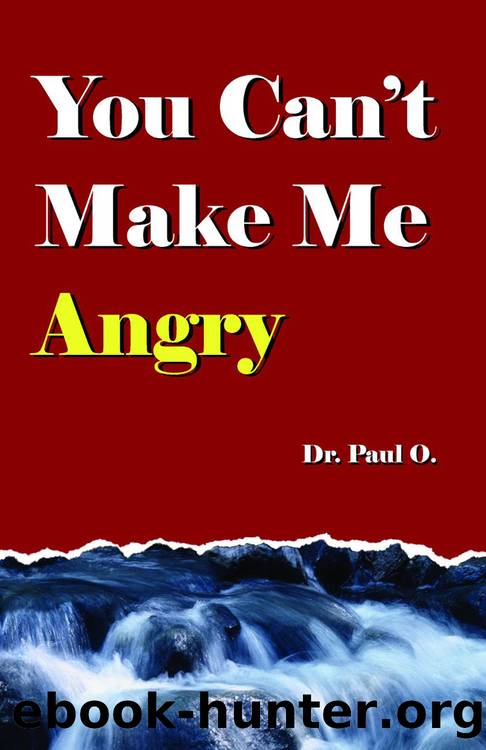You Can't Make Me Angry by Paul O

Author:Paul O.
Language: eng
Format: epub
Publisher: Gatekeeper Press
1 J. I. Rodale, The Synonym Finder, Revised, (Emmaus, PA: Rodale Press, 1978).
2 Emmet Fox, The Sermon On The Mount, (San Francisco: Harper San Francisco, 1989), pp. 168-176.
6. TECHNIQUES
In the book Alcoholics Anonymous, perhaps no single suggestion has more to do with maintaining emotional sobriety than the admonition âWe have ceased fighting anything and anybody.â That apparently means any thing and any bodyâall the way from total strangers to the people we work and live with every day.
We accomplish this unusual feat by maintaining our emotional independence. And we maintain our emotional independence by not allowing others to control our emotions, by not, for instance, allowing them to make us angry. As mentioned earlier, in How To Argue And Win Every Time, Gerry Spence states emphatically that people have only as much power over us as we give them. Indeed, the main thrust of his book seems to be to not fear an opponent because he or she has only as much power over us as we willingly give him or her.
Iâm almost embarrassed when I think of the number of times over the years when I foolishly gave my power to people I didnât even like. Today, on the other hand, it feels great when I manage to rise above the situation and the other personâs behavior. I accomplish this by refusing to submit to their implied request that I become upset. By staying emotionally independent, I maintain control over my emotional state. And by remaining calm, I often have a positive and sometimes a profound effect on the overall situation and the other personâs behavior.
This has been my experience and the experience of others who have been willing to try it. The first, the most crucial step, as repeatedly mentioned, is to remain aware of having a choice. The other person can make us angry only if we agree. If he or she wants to argue, and we realize that arguing with them is a waste of time, we do not have to argue. They can not make us argue. We, not the other person, are in charge of our emotional state. Our emotional choices are our responsibility, not the responsibility of that person or that situation.
Itâs normal to have emotions, to feel, for example, appropriate anger. But itâs not necessary to let anger control us. An old Chinese proverb tells us if we donât control our feelings, our feelings will control us. Anger isnât harmful, itâs what we do with anger that causes problems.
Here are randomly chosen examples of things we can do rather than allow our emotions to be controlled by a unpleasant situation or a difficult person.
Reframe. We can control our emotions by consciously or unconsciously reframing the situation. When something distasteful happens, my usual reaction is determined by the voices in my head. I hear shouts such as, âHe canât talk to me like that! Thatâs not fair; I wonât stand for it!â I then react accordingly.
By reframing this picture, instead of acting as my emotions suggest, I look at the situation from a different perspective.
Download
This site does not store any files on its server. We only index and link to content provided by other sites. Please contact the content providers to delete copyright contents if any and email us, we'll remove relevant links or contents immediately.
The 5 Love Languages: The Secret to Love That Lasts by Gary Chapman(9815)
Doing It: Let's Talk About Sex... by Hannah Witton(9282)
Should I Stay or Should I Go? by Ramani Durvasula(7670)
The Road Less Traveled by M. Scott Peck(7603)
The Lost Art of Listening by Michael P. Nichols(7506)
Daring Greatly by Brene Brown(6514)
Beartown by Fredrik Backman(5756)
We Need to Talk by Celeste Headlee(5615)
Men In Love by Nancy Friday(5240)
The Rules Do Not Apply by Ariel Levy(4970)
The State of Affairs by Esther Perel(4723)
How To Win Friends and Influence People by Dale Carnegie(4513)
Reflections Of A Man by Mr. Amari Soul(4292)
Pillow Thoughts by Courtney Peppernell(4284)
The Ethical Slut by Janet W. Hardy(4258)
Surrounded by Idiots by Thomas Erikson(4085)
Algedonic by r.h. Sin(4064)
He's Just Not That Into You by Greg Behrendt & Liz Tuccillo(3900)
I Love You But I Don't Trust You by Mira Kirshenbaum(3876)
